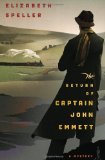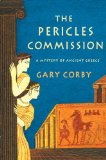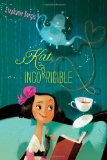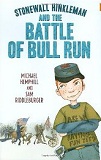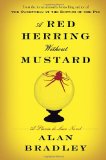Other Books from 2011
I currently have 43 reviews I’ve written that are waiting to be posted, a stack of books waiting for me to review them, and more books I’ve read in 2012 now piling up. I began Sonderbooks when I was working half-time, and I reviewed everything I read (at least everything I enjoyed). I hate it when I can’t keep that up! However, now I’m working full-time, and last July, I had a stroke. Since then, I need more sleep than I did before. I also had more reading time, so I simply got farther behind. Worse, I still have not recovered. Last Thursday, I had a Transient Ischemic Attack (a mini-stroke) lasting only three seconds. But it means the Coumadin I’m taking is not effectively keeping me from strokes, and what’s more, now I feel awful and only lasted a half-day at work today. I’m up writing this in hopes it will make me tired enough to get some sleep when I go to bed.
Anyway, enough complaining! All that is to say that I read some great books that are sitting here waiting and waiting to be reviewed. I’m going to list them now with brief reviews, because they deserve attention and readers. But in the interests of catching up, I’m not going to give them their own pages on Sonderbooks. (Sigh.) I’ll go until my laundry’s done and see how far that takes me.
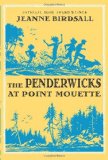 The Penderwicks at Point Mouette, by Jeanne Birdsall
The Penderwicks at Point Mouette, by Jeanne Birdsall
Alfred A. Knopf, New York, 2011. 295 pages.
These first two books, I grant you, I read without having read the books that came before them. I read them anyway, because they were on the Heavy Medal blog’s Mock Newbery Shortlist. This book comes after The Penderwicks and The Penderwicks on Gardam Street.
Quite some time ago, I tried to listen to Penderwicks on audio and got several chapters in, but finally decided I simply couldn’t stand listening to the grandmotherly voice of the reader. Reading The Penderwicks at Point Mouette, at first I heard that same voice in my head and was very put off, but as I persevered, I got more into the story.
The basic story is the classic one of four sisters having fun together. In this book, the oldest sister, Rosalind, is having vacation separate from the younger three. So Skye is concerned about being the OAP (oldest available Penderwick). As someone from a big family, that bothered me a bit that one of the children should feel so responsible for her younger siblings. Parents, that is your job! Though their Dad is going on his honeymoon, so he’s not there, but they are staying with an aunt, for goodness’ sake!
However, that, too, I was able to get past. Once I settled in and enjoyed it, it was a lovely vacation story about three sisters having vacation adventures with their friend, a boy, and new friends they met in Maine. I have to admit I would have loved to read these books with my kids — if I had had daughters instead of sons. This is a nice solid middle grade story, but I do think better for girls than boys.
 The Trouble with May Amelia, by Jennifer L. Holm
The Trouble with May Amelia, by Jennifer L. Holm
Atheneum Books for Young Readers, New York, 2011. 204 pages.
The Trouble with May Amelia is a sequel to Newbery-Honor-winning Our Only May Amelia. This is another solid choice for middle-grade girls, this time historical fiction set in Washington State in 1900. With this one, I was put off by the present tense voice, which I’m prejudiced against, and I didn’t already know the characters like most readers would have. However, I was still quickly pulled into the story.
May Amelia’s the seventh child and the only girl in a Finnish family whose father believes that Girls Are Useless. May Amelia wants desperately to believe that she’s not, but there are some things she’s not good at — like cooking and mending. The book covers plenty of entertaining adventures of pioneer life on the Nasel River.
Then a man comes around who’s got an investment that’s sure to make the family millions. May Amelia’s father has her translate. She does her best, and the reader can see that she does yet be fully aware of impending doom. In fact, lots of troubles befall the family, but through it all we’ve got an upbeat, very fun book to read. I am looking forward to reading Our Only May Amelia when I get there on my quest to read all the Newbery winners and Honor books.
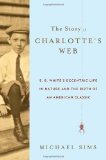 The Story of Charlotte’s Web: E. B. White’s Eccentric Life in Nature and the Birth of an American Classic, by Michael Sims
The Story of Charlotte’s Web: E. B. White’s Eccentric Life in Nature and the Birth of an American Classic, by Michael Sims
Walker & Company, New York, 2011. 307 pages.
This one’s for adults. It’s a biography of E. B. White, and especially focuses on the parts of his life that contributed to the creation of his masterpiece, Charlotte’s Web. I wasn’t surprised to learn of the in-depth research he did on spiders while writing the book, and am all the more impressed by how well he wove those things into the story. I also was not surprised to learn that he had always loved farms and farm animals. That certainly is also obvious in his book.
Those who love children’s literature in general and Charlotte’s Web in particular will enjoy this book.
The Cheshire Cheese Cat: A Dickens of a Tale, by Carmen Agra Deedy & Randall Wright, Drawings by Barry Moser
Peachtree, Atlanta, 2011. 228 pages.
Here’s another solid middle-grade choice, this time for boys or girls. This one’s definitely for people who like animal stories. It has a similar flavor to The Tale of Despereaux, by Kate DiCamillo.
The book is set at an inn which still exists today, Ye Olde Cheshire Cheese, at the time when Charles Dickens was a frequent guest. The main character is a street cat, Skilley, who loves cheese — and The Cheshire Cheese has the best cheese in England.
A resident mouse, Pip, and Skilley come up with a plan. Skilley will catch mice at the inn, but then he will let them go. In return, they will bring him cheese, and they will be allowed to stay at the inn. But this cozy plan has trouble when another street cat is brought into the inn. On top of that, there’s someone in the attic who claims the fate of the entire country rests upon his own fate. Meanwhile, Charles Dickens is looking for an opening for his novel about the French Revolution….
That’s all I have time for tonight, but I hope maybe I’ll have won these books some readers. Happy Reading!
